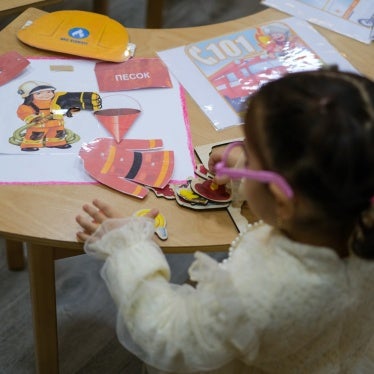By Jo Becker, Advocacy Director of the Children's Rights Division at Human Rights Watch
Published in New York Newsday
May 5, 2002
For Aung, this week's United Nations summit on children, the first such meeting in 10 years, may seem very remote - if he's aware of it at all. Aung is 14 years old, and has already spent three years as a soldier. He was recruited when he was 11, and saw his first battle when he was 12. He's one of tens of thousands of children under the age of 18 in Burma's army, and one of more than 300,000 child soldiers worldwide.
For Aung, this week's United Nations summit on children, the first such meeting in 10 years, may seem very remote - if he's aware of it at all. Aung is 14 years old, and has already spent three years as a soldier. He was recruited when he was 11, and saw his first battle when he was 12. He's one of tens of thousands of children under the age of 18 in Burma's army, and one of more than 300,000 child soldiers worldwide.
Beginning Wednesday, some 70 heads of state will meet in New York to discuss the reality for Aung and other children around the world. This highest level international conference will evaluate governments' progress for children over the last 10 years, and adopt a new plan of action for the next decade.
At the last world summit for children, in 1990, governments agreed on key goals, such as reducing infant mortality by one-third, ensuring universal access to education, providing all children with safe drinking water and improving protections for children affected by war and exploitation. In the end, 155 countries adopted national plans of action.
But, based on their performance, Aung and many other children would give most of these governments poor marks. UN statistics show that 10 million children a year die from malnutrition and preventable diseases; 125 million are out of school; 250 million children under the age of 15 are involved in child labor, including millions who have been trafficked or drawn into the commercial sex trade. Armed conflict has cost the lives of more than 2 million children in 10 years and driven 25 million from their homes. The AIDS pandemic has orphaned 10 million children under age 15. Forty million children each year are not even registered at birth.
The picture is grim, and many governments have failed to live up to the promises they made in 1990. Some have actively committed abuses against children, such as Burma, which recruits children by the thousands for its military, while others have simply stood by and failed to act. For many countries, rich and poor alike, children are simply not a priority. Developing countries invest only 12 percent to 14 percent of their national budgets in basic social services such as health care and education, and development aid from wealthier countries dwindled to new lows during the 1990s. Despite pledges to support universal access to education, only 2 percent of world foreign aid goes to provide schooling for children in poor countries.
This week's summit is a chance to put children back on the agenda and recommit both resources and political will to ensure their rights. Government's summit will set revised targets for health and education and adopt new goals in response to the more recent challenges of HIV/AIDS and the increased awareness of problems like child soldiering, child labor, trafficking of children and sexual exploitation. For the United States, this should be an occasion to demonstrate international leadership on behalf of children. But instead, the summit will highlight an unfortunate distinction that the U.S. shares with only one other country: its failure to ratify the UN's most comprehensive statement on children's rights, the Convention on the Rights of the Child. Although the Clinton administration signed the document in 1995, Senate leaders warned that they would never ratify it and it has yet to come up for a vote.
The convention was adopted by the United Nations just weeks before the 1990 World Summit on Children, and has been ratified by 191 countries, making it the most widely and rapidly ratified treaty in history. It sets the international standard with regard to treatment of children, and in contrast to goals set at global summits like this week's, its provisions are legally binding on governments that ratify it. The only other holdout? Somalia.
What could be so objectionable about a treaty to support the rights of children?
Read with a balanced eye, the convention can hardly be considered a threat to American values. It obligates governments to consider the best interests of the child, to provide children with access to education and health care and to protect them from discrimination, sexual and economic exploitation and other abuse.
Under the Reagan and first Bush administrations, the State Department participated actively in the 10-year drafting of the convention, proposing key articles designed to prevent child abuse, and to protect freedom of religion, expression and association. All of these concepts were included in the convention.
Unfortunately, the treaty has fallen victim to a smear campaign by those who paint it as a threat to parental authority. Organizations such as the Christian Coalition, Focus on the Family and Concerned Women for America have lobbied Congress to oppose it. They fear that promoting the rights of children will interfere with the ability of parents to raise and, when necessary, discipline their children. For example, a provision in the convention referring specifically to cases of child abuse or neglect has been interpreted as giving governments the authority to arbitrarily remove children from their homes.
The critics have characterized the convention as "the most insidious document ever signed by an American president," "the most dangerous attack on parents' rights in the history of the United States" and a "tool for perverts." In reality, the convention instructs governments to "respect the responsibilities, rights and duties of parents" and support families in their efforts to raise and care for their children. References to the importance of the parent-child relationship appear throughout the text. Nevertheless, the well-organized and well-funded opposition has left the treaty with few supporters in Washington.
Another hurdle here is the convention's prohibition of the death penalty for crimes committed before the age of 18. Twenty-two U.S. states allow the death penalty for juvenile offenders. In the last three years, five individuals have been executed in the United States for crimes they committed before the age of 18, and two more executions are scheduled in the next month. During that same period, the Democratic Republic of Congo and Iran were the only other countries in the world known to have carried out such executions.
The U.S. opposition to the convention has been a key obstacle in the negotiations for this week' s UN special session. While other governments see the treaty as the logical starting point for any international action plan for children, the Bush administration's delegation has tried to weaken references to the convention in any plan that emerges, and to remove references to the rights of children. It has opposed any mention of the death penalty. At the same time, the administration is being criticized for trying to roll back international agreements to provide adolescents with sexual and reproductive health education and services.
Soon, however, the United States will take two very positive steps. The Senate Foreign Relations Committee is considering two international treaties. One prohibits the commercial sexual exploitation and sale of children, and is intended to help millions of children who have been drawn into child prostitution, used for pornography or sold into slave-like conditions. The other focuses on the use of child soldiers and prohibits the forced military recruitment of children under age 18, or their use in armed conflict. Both are expected to be ratified in the Senate this year, possibly in the next few weeks.
While U.S. support for these treaties is welcome and important, its position on the Convention on the Rights of the Child remains an international disappointment. Representatives for the Bush administration have asserted the U.S. commitment to addressing the problems of children worldwide, and claim that U.S. legal protections for children are among the strongest in the world. Yet, there's something wrong when the U.S. purports to champion children, but hasn't bothered to join the most universally ratified treaty in history written on their behalf.






